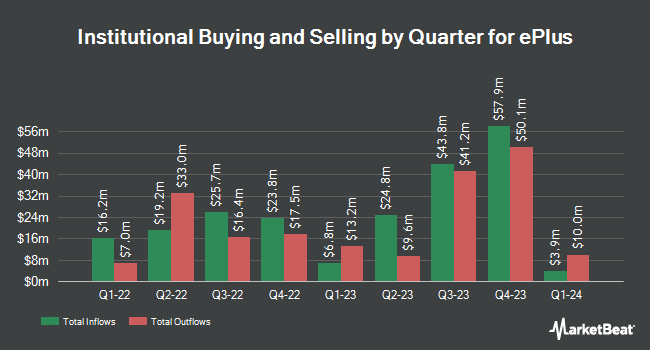LSV Asset Management cut its stake in ePlus inc. (NASDAQ:PLUS - Free Report) by 34.9% in the fourth quarter, according to the company in its most recent Form 13F filing with the Securities and Exchange Commission. The fund owned 28,600 shares of the software maker's stock after selling 15,300 shares during the period. LSV Asset Management owned 0.11% of ePlus worth $2,113,000 as of its most recent filing with the Securities and Exchange Commission.
A number of other large investors also recently modified their holdings of PLUS. HighTower Advisors LLC bought a new stake in ePlus during the 3rd quarter worth about $227,000. Versor Investments LP acquired a new position in ePlus in the fourth quarter valued at approximately $318,000. KLP Kapitalforvaltning AS acquired a new position in ePlus in the fourth quarter valued at approximately $384,000. Principal Financial Group Inc. boosted its stake in ePlus by 3.3% in the fourth quarter. Principal Financial Group Inc. now owns 137,452 shares of the software maker's stock valued at $10,155,000 after acquiring an additional 4,425 shares during the last quarter. Finally, American Century Companies Inc. grew its holdings in ePlus by 18.2% during the 4th quarter. American Century Companies Inc. now owns 790,332 shares of the software maker's stock worth $58,390,000 after acquiring an additional 121,945 shares during the period. 93.80% of the stock is currently owned by institutional investors and hedge funds.
ePlus Trading Up 1.5 %
Shares of ePlus stock traded up $0.86 during trading on Friday, hitting $59.08. 129,841 shares of the company were exchanged, compared to its average volume of 234,835. ePlus inc. has a 1-year low of $53.83 and a 1-year high of $106.98. The company has a debt-to-equity ratio of 0.01, a current ratio of 1.83 and a quick ratio of 1.69. The firm has a market capitalization of $1.57 billion, a P/E ratio of 15.07, a price-to-earnings-growth ratio of 1.83 and a beta of 1.12. The firm's fifty day moving average price is $63.21 and its 200 day moving average price is $76.72.
ePlus (NASDAQ:PLUS - Get Free Report) last released its quarterly earnings results on Wednesday, February 5th. The software maker reported $0.91 EPS for the quarter, missing analysts' consensus estimates of $1.28 by ($0.37). ePlus had a return on equity of 11.23% and a net margin of 4.93%. As a group, sell-side analysts expect that ePlus inc. will post 3.78 earnings per share for the current fiscal year.
Analyst Ratings Changes
Separately, StockNews.com upgraded ePlus from a "hold" rating to a "buy" rating in a research report on Friday.
Check Out Our Latest Stock Report on PLUS
ePlus Company Profile
(
Free Report)
ePlus inc., together with its subsidiaries, provides information technology (IT) solutions that enable organizations to optimize their IT environment and supply chain processes in the United States and internationally. It operates through two segments, Technology and Financing. The Technology segment offers hardware, perpetual and subscription software, maintenance, software assurance, and internally provided and outsourced services; managed services or infrastructure and cloud; and enhanced maintenance support, service desk, storage-as-a-service, cloud hosted and managed, and managed security services; and professional, staff augmentation, cloud consulting, consulting, and security services.
Further Reading

Before you consider ePlus, you'll want to hear this.
MarketBeat keeps track of Wall Street's top-rated and best performing research analysts and the stocks they recommend to their clients on a daily basis. MarketBeat has identified the five stocks that top analysts are quietly whispering to their clients to buy now before the broader market catches on... and ePlus wasn't on the list.
While ePlus currently has a Hold rating among analysts, top-rated analysts believe these five stocks are better buys.
View The Five Stocks Here
Discover the 10 Best High-Yield Dividend Stocks for 2025 and secure reliable income in uncertain markets. Download the report now to identify top dividend payers and avoid common yield traps.
Get This Free Report
Like this article? Share it with a colleague.
Link copied to clipboard.